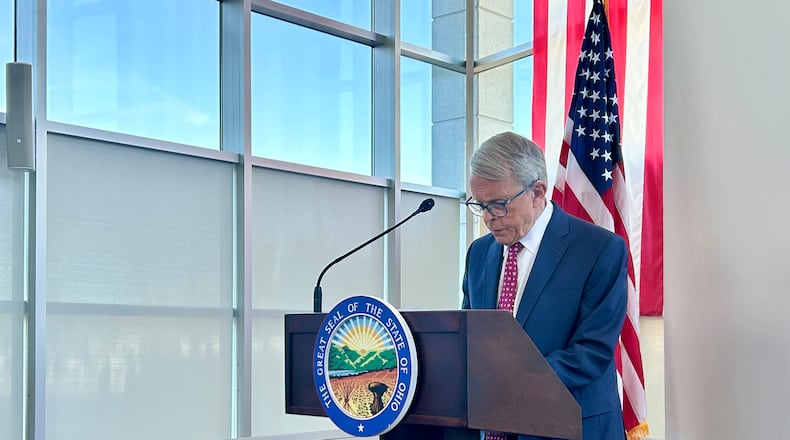DeWine’s press conference came just a day after the long-simmering local issue of Springfield’s immigration situation flared into a national political debate after videos and rumors began circulating widely on social media — including some debunked allegations that were shared by vice presidential candidate Sen. JD Vance, R-Ohio, billionaire and social media site owner Elon Musk and others.
“I came here today because I thought it was important to outline to the people — not only of Springfield but of Ohio and the country — what the essential facts are,” said DeWine at the Tuesday press conference in Columbus.
Road safety
Traffic safety is among DeWine’s top concerns. He said city officials relayed that traffic accidents and erratic driving are on the rise in Springfield, which can be linked back to the growing Haitian population.
In response, DeWine directed a “surge” of state troopers and patrol cars in Springfield, starting Wednesday, to help “deal with traffic concerns in the community.”
“The goal, of course, is to reduce dangerous driving regardless of who the driver is,” said DeWine, though the governor noted that many Haitian immigrants have limited experience driving and come from a country with traffic customs that significantly differ from America’s.
“It’s just a different norm, just a different situation,” said DeWine, who said he’s seen the difference while in Haiti himself.
DeWine said the state has worked for months to increase driver education in Clark County through driving simulators and BMV initiatives to further train Haitian drivers. He lamented an Ohio law that says drivers who get their license while over the age of 18 need no formal driver education.
This issue came up last year after a Haitian man who had a state ID and Mexican drivers license — but no Ohio drivers license — crashed into a school bus, killing one student and injuring dozens of others. The driver was convicted on manslaughter and homicide charges.
Healthcare
DeWine said Springfield’s Haitian community has resulted in a complex strain on the area’s health care systems.
This is in part because any quick flux in population will bring challenges, but also because political unrest and violence in Haiti has caused many doctors to flee, which has resulted in a Haiti healthcare system that is “much worse today than it has been in the past, and it has never been good.”
“What that means is you have 15,000 people or so in Springfield who really have not had healthcare, and if they have had healthcare, it really wasn’t very much throughout their life,” DeWine said.
DeWine said these factorshave put a strain on local systems that has resulted in longer wait periods for all patients.
For this reason, DeWine directed the Ohio Department of Health to work alongside Clark County Health Department and other providers to “dramatically expand access to primary care” in the area and appropriated $2.5 million to that end.
Also a point of priority for DeWine is increasing access to vaccinations, given that Haitian immigrants largely have not had access to vaccines that have for the most part eradicated diseases from American populations, such as whooping cough.
Despite the low levels of vaccination, Ohio Department of Health Director Dr. Bruce Vanderhoff said there are no discernible increases in vaccine preventable illnesses around Springfield. “But, we want to be acting in a prudent manner to not leave that to chance,” he said.
Calls for federal action
“The federal government simply has to be a part of the solution,” said DeWine, who said he’s gotten “zero indication” from the government that they’re working on a plan to help communities like Springfield. “They have to step up. It’s their policies that have created these surges.”
Springfield’s Haitian immigrant population is largely attributed to the country’s “Temporary Protected Status” program, which allows citizens of Haiti and 15 other countries in distress to apply for a protected legal status to live in America for 18 months at a time.
Apart from that, the program is rather laissez-faire — it doesn’t direct immigrants where to go, nor does it provide federal funds to the cities and towns where immigrant populations naturally start to grow.
Findlay and Lima are also seeing smaller-scaled surges of Haitian immigration, according to DeWine.
DeWine argued that such a policy would create growing pains in any established community and for the immigrant populations that are trying to build a new life in a foreign place.
“The Haitians who are here are hardworking people. They have families and they care about their families and they care about their children. They came to Springfield, Ohio for work and many, many, many of them are working and filling positions in Springfield.
“I want to be very clear: I am not against this program; I’m not against this program. What I do say though, with this program, there has to be a plan to prevent what we’re seeing in Springfield. But, if in fact they do occur, we clearly need help from the federal government.”
For more stories like this, sign up for our Ohio Politics newsletter. It’s free, curated, and delivered straight to your inbox every Thursday evening.
Avery Kreemer can be reached at 614-981-1422, on X, via email, or you can drop him a comment/tip with the survey below.
About the Author

